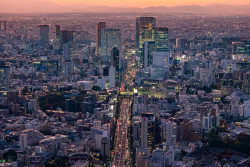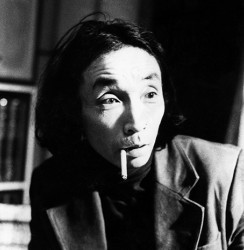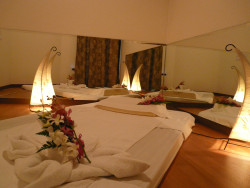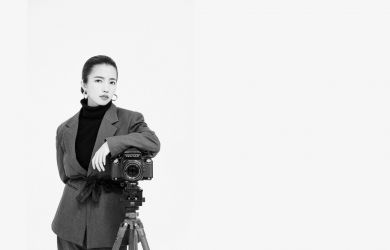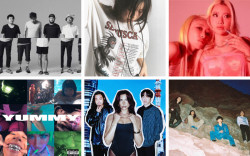
Originally published on metropolis.co.jp on August 2013
With an unsettling eight shows over three days at Fuji Rock 2012, Argentina’s Onda Vaga were the universally acclaimed masters of the event’s small stages. Now they return to Japan to tour their new disc, Magma Elemental. We caught up with singer-songwriter Marcelo Blanco ahead of the quintet’s biggest gig yet in their native Buenos Aires.
What does Metropolis find you doing?
I’m in a bar around the corner from our studio, getting ready to rehearse songs from the new album.
Where does Onda Vaga fit in in the Argentine music scene?
We are between different scenes, between the rock and reggae and folk scenes—we take some of these different sounds to make our own scene.
Do you perform regularly in Buenos Aires?
Even though we like to make albums, our strength comes from the shows. It’s what gives us joy and brings us together with the public—it’s what keeps us alive as a band. So we play often. But actually our next show is going to be our biggest—it’s in one of the biggest venues in Buenos Aires. So we took a pause and haven’t played for two months.
You did eight sets at Fuji last year…
That was amazing for us. The response was awesome and unexpected.
What’s it like for a South American band trying to reach out from far away?
The first challenge is that you have to be conscious and willing to do it, and spend energy on it—at first sight it seems difficult because of money. But once you take that first step, it becomes natural. We’ve traveled to Europe four times now, and if I didn’t go there this year I would miss it a lot. It’s a matter of making the decision to do it. Everything in life is like that. When you want something and put your energies towards it, it can come true.
Do you make any conscious effort, like recording English songs?
What we did for our Japanese trip was to make a cover version of a Monkees song, “Day Dream Believer,” which was a suggestion from our label in Japan. Usually we make our own artistic decisions—but once we got to Japan we decided to do it. And it was awesome. The first chord at Fuji Rock, people responded, some were even crying. It was magic. But we wouldn’t sing a song in English just to reach an international audience. The essential part of our music is the vibe—language doesn’t matter.
Tell us about the new album.
We wanted to take control from beginning to end—we didn’t want to make any excuses, so it took a long time to finish until we were satisfied with it. Our stuff is mostly about mixing rhythms, we put some rhythms into the blender, and music comes out. The new album has disco and Brazilian rhythms, and we explored different sounds and instruments than we usually use. We are five decision-makers so it’s not always easy to agree.
How about the songs’ subject matter?
It’s not a concept album, but we share feelings toward life and joy and love in all its shapes, and we sing about friendship because we’re friends, and we sing about taking life to a nice place—about being able to quiet the neurotic unnecessary thoughts in society that make you feel badly for no reason—and that behind that there is always joy and something good. Yesterday a journalist asked about our politics, and we said our politics isn’t about which party we’re going to vote for, but which way you’re going to lead your life. Political decisions are not just about voting, everyday you make political decisions: whether to go to work, or not, or call your mother—all of that is also politics.
Tell us about one song in particular.
One song I particularly like is “En Cueros,” which would be like “bare-chested.” It talks about staying bare-chested at home, in silence. The lyrics go, “Let the only things that escape from our mouths be kiss. If I spoke I would lie to you because words lie. Let’s remember each other so when the time passes we will not forget.” Of course we have many songs and the favorites come and go.
How are you touring the new album?
On Aug 20 we have our big show, and then we head to Madrid and Japan. The songs are ready and sound good. Our new album came out in Japan before it did in Argentina. Our label in Japan says it was second in world music sales in Tower Records Japan.
Does the album still have value as a format?
I think so. We are pretty old-fashioned. We like albums—that’s what we grew up with. We like to listen to a bunch of songs the artist put together. I think the album format does work. I have the numbers and people are still downloading and paying for albums. At the same time we don’t pursue people who download for free. At this point we are just happy that people want to listen to us. But if we couldn’t make a living from our shows maybe I would feel differently.
You are five, and you’re all singer-songwriters. What was your first impression of each other?
We knew each other for a long time before forming the band. Nacho and me used to play in another band, and are high school classmates. The others played in another band that we were close to. Before we got together as Onda Vaga we would play their cover songs. And we used to go to the beach in Uruguay together, and arranged to play a gig one night, and the waiter from a bar asked which name should I put on the board, and we said, “Onda Vaga” [Vague Wave]. When we got back to Buenos Aires we kind of forgot about it. But then a photographer friend was having an opening, and she asked us to play. That’s when we decided to start doing it for real. But we did it without the pressure of trying to make it—we did it just for fun. And that remains the spirit of the band.
[youtube]zbAR7qJq-hs[/youtube]
Onda Vaga “Marineros” directed by Metropolis editor David Labi

